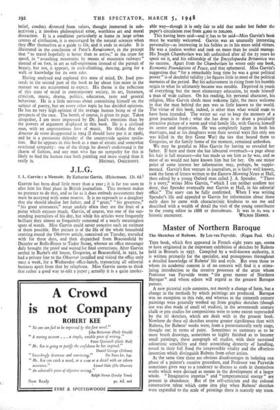J.L.G.
J. L. Garvin : a Memoir. By Katharine Garvin. (Heinemann. 12s. 6d.)
GARVIN has been dead little more than a year ; it is far too soon to allot him his final place in British journalism. This memoir makes no pretence to do that, and so far as it does embody assessments they must be accepted with some reserve. It is no reproach to a daughter that she should idealise her father, and if " great," " his greatness," "his great utterances," recur unduly often they are the fruit of a pietas which excuses much. Garvin, of course, was one of the out- standing journalists of his day, but while his articles were frequently brilliant they almost as frequently consisted of a nearly meaningless spate of words. Miss Garvin could never conceive such an estimate of them possible. Her picture is of the life of the whole household centring round the Observer article, conceived on Tuesday, travailed with for three days, and then dispatched from Beaconsfield by Daimler or Rolls-Royce to Tudor Street, whence an office messenger duly brought the proof and waited for final corrections. After Garvin settled in Burke's old house, Gregories, at Beaconsfield, in 1922, he had a private line to the Observer installed and visited the office only once a week, for a Wednesday office-lunch, transacting all editorial business apart from that by telephone. Miss Garvin seems to think that rather a good way to edit a paper ; actually it is a quite intoler-
able way—though it is only fair to add that under her father the paper's circulation rose from 4,000 to 200,000.
This having been said—and it has to be said—Miss Garvin's book must be warmly welcomed. Garvin. was an unusually interesting personality—as interesting in his foibles as in his more solid virtues. He was a tireless worker and took on more than he could manage. His 7oseph Chamberlain was left unfinished after all the 25 years he spent on it, and his editorship of the Encyclopaedia Britannica was no success. Apart from the Chamberlain he wrote only one book, Economic Foundations of Peace, and that ephemeral. Miss Garvin's suggestion that " for a remarkably long time he was a great political power " is of doubtful validity ; he figures little in most of the political memoirs of the period. But his achievement in rising from his humble origin to what he ultimately became was notable. Deprived in youth of everything but the most elementary education, he made himself a man of wide culture. On his reading, his personal character, his religion, Miss Garvin sheds most welcome light, the more welcome in that the man behind the pen was so little known to the world. The virtue of this book, indeed, is other than what would sees n to have been intended. The writer set out to keep the memory of a great journalist fresh ; what she has done is to draw a peculiarly attractive picture of a warm and vital family life, with Garvin himself its centre and inspiration. He was completely happy in both his marriages, and as his daughters went their several ways (his only son was killed in the first Great War) the ties that bound them to Gregories, or the family home of the moment, remained unbroken.
We may be grateful to Miss Garvin for having so revealed her father. If here and there she has laboured overmuch—a page about his hair is full measure—she has made us see him as he was, and as most of us would not have known him but for her. On one minor point of some interest her information may, perhaps, be supple- mented. Garvin's first venture in journalism, as is fairly well known, took the form of letters written to the Eastern Morning News at Hull, then edited by a young Oxford man called J. A. Spender. " There is a story," writes Miss Garvin, "which I can neither confirm nor deny, that Spender eventually met Garvin at Hull, in his editorial office." The story can be fully confirmed. When I was writing Spender's life and appealed to Garvin for information about those early days he came with characteristic kindness to see me and described with a wealth of detail the visit of the young contributor to the young editor in 1888 or thereabouts. It was in its way a






























 Previous page
Previous page